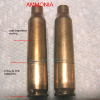grsjax
Member
Big Cheese
Good point. I usually only neck size and haven't noticed a problem but I don't shoot thousands of rounds a year and most of my cases have only been reloaded a few times. I may just not have a large enough sample to observe any effects. Something to keep in mind.
One question. Is it exposure to ammonia while being stressed or ammonia exposure on a previously stressed sample that is the problem?
Good point. I usually only neck size and haven't noticed a problem but I don't shoot thousands of rounds a year and most of my cases have only been reloaded a few times. I may just not have a large enough sample to observe any effects. Something to keep in mind.
One question. Is it exposure to ammonia while being stressed or ammonia exposure on a previously stressed sample that is the problem?


 I built a tumbler using a coffee can, that worked much better, and was quicker. Now I use a vibratory tumbler.
I built a tumbler using a coffee can, that worked much better, and was quicker. Now I use a vibratory tumbler.

